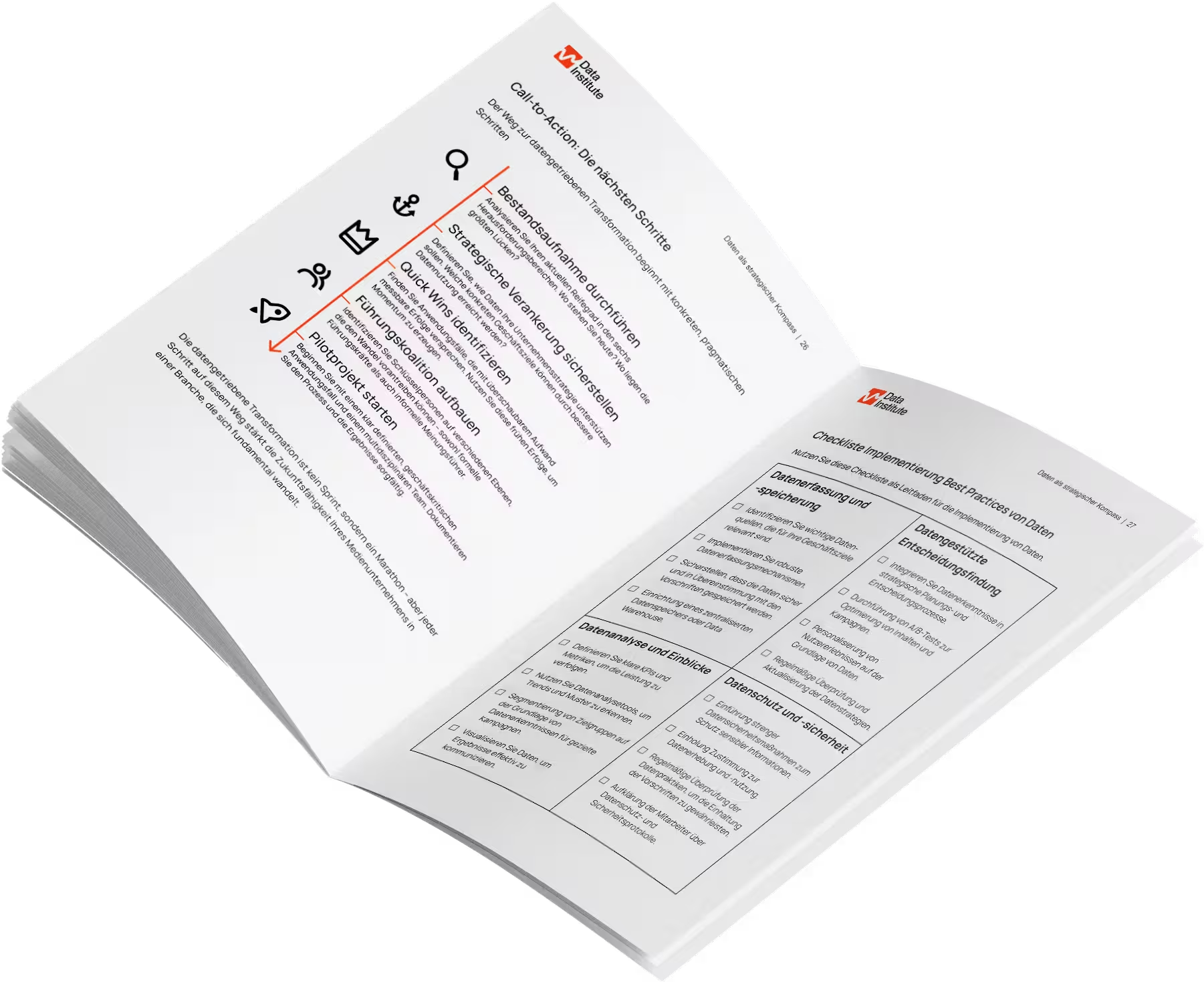Comparing data catalogs: Alation, Collibra and Co


The roadmap for data-driven transformation
The ePaper shows you strategies, success stories and a checklist for a direct start into the digital future.

- Das ist eine H2
- Das ist eine H3
Data catalog comparison
In the blog post, we will name the most important and well-known providers of data catalog solutions and briefly discuss them. This gives you an overview and gets to know the most well-known solutions.
If you want to learn more about Data Catalog, we've written a detailed article about it. Everything about data catalogs
Alation
Alation is a leading data governance platform that helps companies unlock the full value of their data. Thanks to powerful machine learning algorithms, Alation offers an intuitive search that enables users to find and understand relevant data in seconds.
Key features of Alation
- Smart search: Find data easily using natural language input and benefit from personalized recommendations.
- Active governance: Improve collaboration between data owners and consumers and ensure that data is used correctly.
- Central knowledge base: Create a central location for all metadata to promote data understanding across the organization.
- scalability: Adapt Alation to the growing needs of your company and integrate it seamlessly into your existing IT landscape.
With Alation, you can optimize your data governance, improve data quality, and make well-founded decisions based on reliable data.
What makes Alation different from other data catalog tools?
- Focus on the user: Alation was built from the ground up with the goal of maximizing user experience.
- Machine learning: By using machine learning, Alation is constantly learning and thus improving search results and recommendations.
- Collaboration: Alation promotes collaboration between employees and makes it possible to work together on data.
Who is Alation suitable for?
Alation is suitable for companies of all sizes who want to effectively manage and use their data. In particular, companies with large amounts of data and complex data landscapes.
Site: https://www.alation.com
Amundsen Lyft
Amundsen, named after Norwegian explorer Ronald Amundsen, is a data discovery and metadata engine developed by Lyft.
By centrally cataloging data from various sources and providing detailed metadata, Amundsen enables efficient data analysis and supports data-driven decisions.
Key features of Amundsen Lyft
- Data discovery: Find relevant data quickly using a simple text search and advanced filter options.
- Metadata management: Create and manage detailed metadata about your data to understand its meaning and context.
- Popularity based search: Discover commonly used data and best practices.
- Detailed data views: Simply navigate through complex data structures and get comprehensive information about your data.
Benefits of Amundsen Lyft
- Increased productivity: Speed up your data analysis and make faster decisions.
- Improved collaboration: Encourage collaboration between data scientists, engineers, and business users.
- Flexibility: Tailor Amundsen to meet your unique needs.
- Open source: Benefit from a large and active community.
Site: https://www.amundsen.io
Apache Atlas
Apache Atlas is a powerful Open-source metadata management platform, which helps companies understand and manage their complex data landscapes. By creating and managing metadata, Atlas enables improved data quality, makes it easier to search for relevant data, and supports data analysis.
Key features of Apache Atlas
- Metadata management: Create and manage detailed metadata about your data to understand its meaning and context.
- Data visualization: Visualize complex relationships between your data to identify patterns and trends.
- Data quality: Guarantee high data quality by defining and enforcing data standards
- scalability: Apache Atlas is flexible and scalable, so it can be adapted to meet your organization's growing needs.
- Community: Benefit from a large and active community that contributes to the continuous development of the platform.
Apache Atlas use cases
- Data Governance: Define guidelines and standards for using data.
- Data integration: Connect data from various sources and create a unified data catalog.
- Data lineage: Track the origin and transformation of data across the entire data life cycle.
Why Apache Atlas
- Open source: Free to use and adaptable to individual requirements.
- Flexible: Can be integrated into existing IT landscapes.
- Scalable: Suitable for businesses of all sizes
- Active community: Large and dedicated community for support and development.
Site: https://atlas.apache.org/#/
Collibra
Collibra is a leading data cataloging platform that helps companies unify, understand, and use their data. By combining data from various sources in a central platform, Collibra provides a comprehensive overview of the entire data landscape.
Key features of Collibra
- Data unification: Collibra bridges silos and creates a central point of contact for all data, from source to application.
- Integrated Governance: With integrated governance and data protection features, Collibra ensures compliance regulations and protects sensitive data.
- Ease of use: The intuitive interface allows users from different areas to access the data they need without much effort.
- Flexibility: Collibra adapts to the individual requirements of every company and can be integrated into existing IT landscapes.
- scalability: The platform grows with the company's requirements and can also be used for large amounts of data.
Application examples
- Data quality: Collibra helps identify and fix data quality issues.
- Compliance: The platform helps companies comply with data protection regulations such as the GDPR.
- Data analysis: Collibra enables faster and easier data analysis by providing relevant data
Site: https://www.collibra.com/us/en
Cogniti (formerly Aginity)
Aginity is now called Coginiti. This step was taken to better reflect the comprehensive nature of the platform, which goes beyond mere data cataloging.
Coginiti is an innovative platform that goes far beyond the traditional functions of a data catalog. By combining data cataloging and analysis management, Aginity enables companies to use their data more efficiently and make data-based decisions.
Key features of Coginiti
- Centralized management of data and analytics: Consolidate all of your data and analytics into a single platform.
- Analytical logic: Write your analyses once and reuse them anywhere—for greater efficiency and consistency.
- User-friendly interface: Navigate your data and analytics intuitively.
- Strong governance features: Guarantee the quality and security of your data
- Flexibility: Tailor Aginity to meet your unique needs.
Benefits of Coginiti
- Increased productivity: Speed up your data analysis and make data-based decisions faster.
- Improved collaboration: Encourage collaboration between data engineers and analysts
- Lower time-to-market: Get your products and services to market faster.
- Higher data quality: Ensure high data quality through centralized management and validation
Site: https://www.coginiti.co
data.world
data.world is an innovative cloud-based platform for data catalogs, which was developed specifically for modern data infrastructures. With data.world, companies can centrally manage, discover and use their data.
Key features of data.world
- Powerful SearchBuilder: Find relevant data quickly and easily using an intuitive search function with numerous filter options.
- Automated data discovery: Automatically identify sensitive data and protect it accordingly.
- Flexible data modeling: Create custom metadata fields to describe and categorize your data in detail.
- Collaboration: Collaborate efficiently with colleagues and share insights.
- Integrations: Seamlessly integrate data.world into your existing data landscape.
Benefits of data.world
- Increased productivity: Speed up your data analysis and make data-based decisions faster.
- Improved data quality: Guarantee high data quality through automated checks and metadata management
- Compliance: Support compliance with data protection regulations.
- scalability: Adapt data.world to the growing requirements of your company.
Site: https://data.world
DataHub
DataHub is a powerful Open-source metadata management platform, which was developed specifically for modern data landscapes. Originally developed by LinkedIn and acryldata, DataHub helps companies understand, manage, and use their data.
Key features of DataHub
- Scalable architecture: DataHub is designed for constantly growing amounts of data and complex data landscapes. The architecture enables companies to flexibly scale their metadata management processes.
- Federated data governance: Establish uniform data governance across different systems and ensure high data quality.
- Comprehensive data discovery: Find the data you're looking for quickly and easily using an intuitive search function that also searches for related terms and tags.
- Data lineage: Track where data came from and understand how it was transformed.
- Flexible integration: Seamlessly integrate DataHub into your existing data infrastructure and benefit from a growing number of plugins and connectors.
- Active community: Benefit from a large and engaged community that contributes to the continuous development of the platform.
Site: https://datahubproject.io
Alex Solutions
Alex Solutions is a powerful, technology-independent data catalog that helps companies organize, understand, and use their data landscape. By integrating Alex Solutions into your existing IT infrastructure, you gain a comprehensive overview of your entire data inventory.
Key features of Alex Solutions
- Business glossary: Define clear terms and link them to your data, processes, and business goals.
- Data profiling: Get detailed insights into the structure, quality, and content of your data.
- Smart tagging: Use machine learning to automatically tag your data and speed up searches.
- Source of data: Trace the origin of your data and ensure high data quality.
- Flexible integration: Seamlessly integrate Alex Solutions with your existing systems, such as databases, data lakes, BI tools, and data governance solutions.
- User-friendly interface: Navigate your data intuitively and quickly find the information you need.
Site: https://alexsolutions.com
Cambridge Semantics Anzo
Cambridge Semantics Anzo is an innovative platform for data discovery and integration that makes it possible to connect and harmonize internal and external data sources, including cloud or on-premise data lakes.
Anzo uses advanced graph models to visualize and analyze complex relationships between data. This semantic layer enables profound business contextualization and makes it easier to discover hidden relationships.
The platform offers extensive functions for data cleansing, transformation, and validation. For example, users can standardize, convert, and clean data to create a uniform database.
Anzo enables users to quickly and easily discover hidden insights in their data. Thanks to the intuitive user interface and powerful search functions, complex data landscapes can be efficiently searched and analyzed.
Key features of Anzo
Graph-based data modeling: Representation of complex relationships between data in the form of graphs. Visual exploration of data connections
Data integration: Linking different data sources (structured, unstructured), harmonizing data from different systems, creating a uniform data image
Data cleansing and transformation: Standardization, conversion and purification of data, creation of data quality profiles, ensuring a uniform database
Data discovery and search: Intuitive search for information about complex data landscapes, use of natural language for search, faster and more efficient data analysis
Machine learning: Prepare data for machine learning models, automate feature engineering, accelerate machine learning projects
Site: https://cambridgesemantics.com
Cloudera
Cloudera Navigator is a powerful data governance solution specifically designed for Hadoop-Environments. It allows users to intuitively search and explore their Hadoop data via an easy-to-use interface. This allows data to be filtered and found according to various criteria, such as names, tags, descriptions, or metadata.
As an integral part of Cloudera Enterprise, Navigator provides seamless integration with the entire Hadoop platform and enables comprehensive management of the data landscape.
Navigator allows you to centrally manage metadata, including user-defined tags and comments. This makes it easier to track data origin, classify by business unit, and comply with compliance regulations. By combining data discovery, optimization, monitoring, and metadata management, Navigator helps companies improve data quality and the efficiency of their data processing.
Key features of Cloudera
Site: https://de.cloudera.com
Dawiso
Dawiso is a software platform that helps companies manage and use their data. It offers a range of features, including a data catalog, interactive data lineage, and a business glossary. Dawiso can also be used to create data products and decentralize the data architecture.
Key features of dawiso
- Data catalog and metadata management: Dawiso allows you to store various types of metadata, from technical data platforms to operational and business metadata. The platform has an advanced search engine with dynamic filters, full-text indexing, and fuzzy logic. To simplify navigation, Dawiso offers knowledge graphs that provide a quick overview of all related data sets.
- Integrations and connectors: Dawiso provides metadata scanners for various databases including Snowflake, Microsoft SQL, Oracle, Teradata, Postgres, and Azure Data Lake. The platform can be integrated with PowerBI, Tableau, and Qlik. It also supports scanners for ETL tools such as DBT, WhereScape, Coalesce.io, VaultSpeed, and BigEval.
- Automate and update: Dawiso uses scheduled scanners to automatically import and analyze metadata. Users can adjust the frequency of scans for individual databases or tables to ensure critical data is up to date.
- Data democratization and collaboration: Dawiso facilitates the connection between technical metadata and business knowledge, which promotes data democratization. The platform serves as a unified source for data and analytics assets and provides a central location for discovering and understanding corporate data.
- Technical aspects: Dawiso offers a database API that allows Dawiso data to be integrated with other systems (part of the enterprise pricing plan). The platform is designed to process and manage large amounts of data.
- Support and resources: Dawiso offers a constantly growing knowledge base, tutorials, and documentation. Additional support is provided by a chatbot and a user forum.
Site: https://www.dawiso.com/
Denodo
Denodo is a leading data management platform that helps companies unify and develop their heterogeneous data landscapes. In addition to comprehensive functions for data integration and virtualization, Denodo also offers powerful metadata management that enables central search and discovery of data.
By creating detailed data profiles and visualizing data relationships, Denodo helps ensure data quality and governance. As a pioneer in data virtualization, Denodo enables companies to create a logical view of data without the need for physical copies of data. This enables self-service business intelligence and rapid delivery of data for analytical applications. Denodo serves customers from various industries and sizes and offers a flexible solution to the challenges of modern data management.
Key features of denodo
- Metadata management: Denodo offers a central platform for managing metadata from various data sources, which enables better visibility and searchability of the data.
- Data discovery: The intuitive user interface and powerful search feature allow users to easily find and understand data without the need for deep technical knowledge.
- Data quality: Denodo helps ensure data quality by creating data profiles and visualizing data relationships.
- Data virtualization: As Denodo's core competency, data virtualization enables flexible and agile data integration without the need to create physical copies of data.
- Self-service BI: Denodo supports business users to analyze data independently by providing a simple and intuitive interface for accessing data.
- Integration into existing systems: Denodo can be seamlessly integrated into existing IT landscapes and offers a variety of connectors for various data sources.
- scalability: Denodo is able to handle growing amounts of data and complex data landscapes and offers a high degree of scalability.
- efficiency: Denodo is characterized by high performance when providing data for analytical applications.
Site: https://www.denodo.com/en
Erwin
erwin is a comprehensive data management platform that helps companies understand, manage and use their data. As a powerful data catalog, erwin provides a central view of all company data by linking physical metadata with specific business terms. By integrating metadata from various sources and visualizing complex dependencies, erwin provides a solid basis for data discovery, analysis, and governance.
Key features of erwin
- Comprehensive metadata management: Unify and manage metadata from multiple sources.
- Central business glossary: Creating a common language for data within the organization.
- Data lineage: Visualize the origin and history of data
- Data quality: Helping ensure data quality through data profiling and validation
- Governance features: Enforce data policies and control access to data.
- Integration into enterprise architecture: Linking data to business processes and applications.
erwin is characterized by its comprehensive governance functions and close integration into the corporate architecture. This enables companies to create a trustworthy and consistent database that can be used for data-driven decisions.
Site: https://www.erwin.com/de-de/products/erwin-data-catalog/
IBM Watson Catalog
IBM Watson Knowledge Catalog is an innovative solution for data discovery and management based on artificial intelligence. Using Watson technologies, the catalog enables an independent and intuitive search for data and machine learning models. Users can access, maintain, and share data regardless of where it is stored.
Key features of IBM Watson Knowledge Catalog
- AI-powered data discovery: Automatically discover and classify data using natural language processing and machine learning.
- Real-Time Data Virtualization: Flexible access to data from various sources without time-consuming data integration processes.
- Automatic metadata generation: Create comprehensive metadata that makes it easy to search and understand data.
- Dynamic data masking: Protect sensitive data by automatically masking when needed.
- InstaScan: Automated analysis of unstructured data to identify risks and improve data quality.
IBM Watson Knowledge Catalog is closely integrated with the IBM ecosystem and provides seamless integration with IBM Cloud Pak for Data. As a result, companies can benefit from the Watson platform and use their data for advanced analytics and machine learning.
Site: https://www.ibm.com/products/knowledge-catalog
Qlik Catalog
Qlik Catalog is a central platform for managing and providing enterprise data. It provides a secure and accessible catalog of all data available for analysis, regardless of where it is stored.
Key features of Qlik Catalog
- Self-service marketplace: Users can easily and intuitively search for the data they need, select it, and export it for their analyses.
- Automatic data preparation: Qlik Catalog automates many time-consuming data preparation tasks, such as data profiling, data cleansing, and data conversion.
- Comprehensive metadata: Automatically generated metadata enables a quick and accurate search for relevant data.
- Integrate with Qlik Sense: Seamless transition from data discovery to analysis in Qlik Sense and other analytics tools.
With its intuitive user interface and powerful automation options, Qlik Catalog enables fast and efficient data delivery for the entire organization. This helps companies make data-based decisions and strengthen their competitive advantage.
Site: https://www.qlik.com/de-de/products/catalog-and-lineage
SAP Data Intelligence Cloud
SAP Data Intelligence is a powerful and flexible data management platform that helps companies maximize the value of their data. Powered by artificial intelligence, it enables seamless integration, processing and analysis of diverse data sources.
Key features of SAP Data Intelligence
- AI-powered data processing: Automate tasks such as data preparation, feature engineering, and model development using machine learning.
- Data orchestration: Build and manage complex data pipelines across distributed architectures.
- Metadata management: Centralized metadata management for improved data quality and governance
- Versatile data processing: Support for structured, unstructured, and semi-structured data, including text, image, video, and IoT data.
- Integration into the SAP ecosystem: Seamless connection with other SAP solutions for an end-to-end data management solution.
With SAP Data Intelligence, companies can effectively use their data to gain new insights and make data-driven decisions. The platform offers a flexible and scalable solution to the challenges of modern data management.
Site: https://www.sap.com/products/technology-platform/data-intelligence.html
Tableau Catalog
Tableau Catalog provides a central and comprehensive overview of all data used in Tableau. By automatically combining all data sources into a clear list, Tableau Catalog provides quick and easy access to the information you need.
Key features of Tableau Catalog
- Self-service data discovery: Users can search for and select data for analysis without IT assistance.
- Comprehensive metadata: Detailed information about the origin, quality and use of the data helps you choose the right data source.
- Improved data quality: The transparency of data origin and the ability to check the data quality increases the trustworthiness of the analyses.
- Integrate with Tableau: Seamless integration with the entire Tableau platform for a consistent user experience
- Governance: Helping with data management and governance by providing a centralized overview and traceability of changes.
With Tableau Catalog, companies can create a trustworthy and reliable database that can be used for data-driven decisions.
Site: https://www.tableau.com/de-de/products/add-ons/catalog
Which tool is the right one?
Deciding between the wide range of data catalog tools is not that easy. The tool must fit into the existing tool stack, but also with Organizational form, for architecture and to culture of the company.
Are you looking for help choosing the right tool for your data analysis? Then The Data Institute is the right place for you!
We are a renowned consulting firm in the data sector, which helps companies drive product innovations and strengthen their branding through data-based insights.
Our expertise lies in Combining technology and humanity, who Design of processes and corporate cultures as well as in the Applying a data and customer-oriented approach.
Together with you, we develop individual data strategies and put them into practice.

More about data catalogs and lots of tool tips?
You can find it in our newsletter!
More about data catalogs and lots of tool tips?
You can find it in our newsletter!

More about data catalogs and lots of tool tips?
You can find it in our newsletter!

Related case studies
There are suitable case studies on this topic

Do you need help choosing?
We support our customers in selecting and implementing tools independently of any tools.
Do you need help choosing?
We support our customers in selecting and implementing tools independently of any tools.

Do you need help choosing?
We support our customers in selecting and implementing tools independently of any tools.



